Can Dogs Eat Cheese? A Complete Guide to Cheese Consumption for Canines

If you’re a pet parent, you might be curious about whether it’s okay to give your beloved pooch a bit of cheese. Considering cheese is a tasty and healthy option that we humans regularly indulge in, it’s understandable you’d want your dog to experience the same joy. However, the question arises – is cheese a good choice for canines? Let’s explore this topic further.
Cheese is safe for dogs to eat, but only in small amounts and of the appropriate types. Additionally, only give those cheese to your dogs that are low in lactose and have low fat. It is because dogs can have trouble digesting lactose.
Cheeses like cheddar cheese, mozzarella cheese, cottage cheese, and goat cheese are all good options for canines. But, it would help if you steered clear of giving your dog certain kinds of cheese like blue cheese, feta cheese, and processed cheese since these kinds of cheeses can be dangerous to dogs.
Furthermore, cheese shouldn’t make up more than 10% of a dog’s daily calorie intake and should be given to them as a treat instead.
Cheese Benefits for Dogs
Cheese has been shown to offer a variety of health benefits to dogs. The primary benefit of feeding cheese is that it contains a significant amount of protein, which is required to develop and maintain strong muscles.
Cheese also has calcium, which is an essential mineral for building and maintaining healthy bones and teeth. In addition, cheese is a potential source of vitamins A and B (especially b complex vitamins), as well as the minerals zinc and phosphorus.
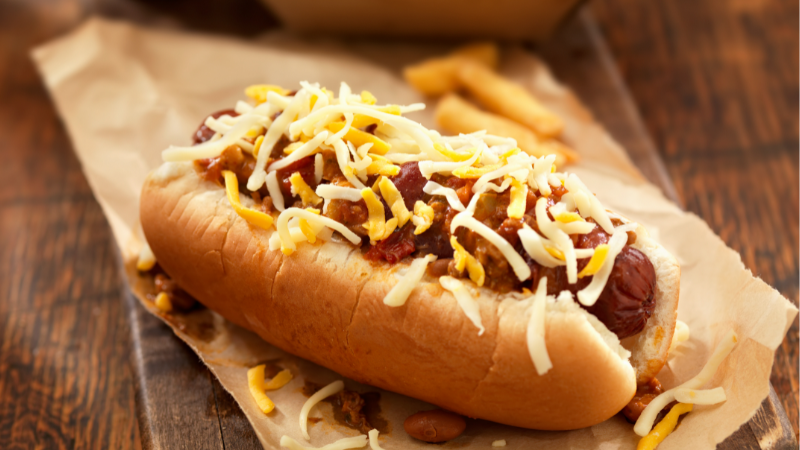
Cheese Types that Dogs Can Eat
Cheese is a delicious treat that can be given to dogs; however, it is essential to select the appropriate kinds of cheese to your dog in order to guarantee that it is both safe and beneficial for their health.
The following are some varieties of cheese that are safe for pups to consume:
- Cheddar Cheese
Cheddar cheese is a well-known kind of cheese that is occasionally recommended for canine consumption in small amount of quantities.
It has a minimal amount of lactose and a significant quantity of protein and calcium, all of which are necessary to develop healthy and strong bones and muscles.
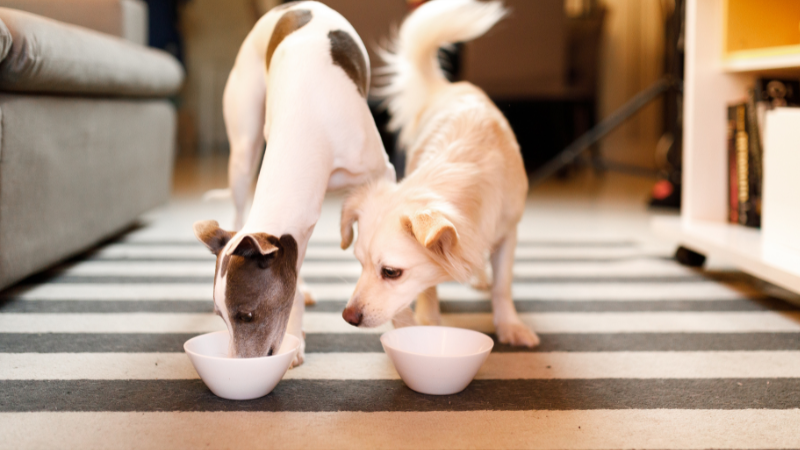
- Mozzarella Cheese
Another delicious alternative that’s perfect for dogs is mozzarella cheese. It has a relatively low amount of lactose and a subtle taste that many dogs find appealing. In addition to that, it is an excellent provider of calcium and protein.
- Cottage Cheese
Cottage cheese is a mild, creamy cheese that is simple for dogs to stomach due to its consistency. Because it is low in lactose yet has a high protein high fat content too, it is an excellent option for dogs. Dogs eat cottage cheese as a source of protein and other essential nutrients, but it should be given in moderation and without any added sugars or flavors.
- Goat Cheese
A dog could enjoy the creamy texture and sharp flavor of goat cheese. It has a moderate amount of lactose and is an excellent source of protein and calcium. Also, dogs digest cheese of this type way more easily than cow’s milk cheese.
Here you can find the effect of cheese as a probiotic on Beagles.
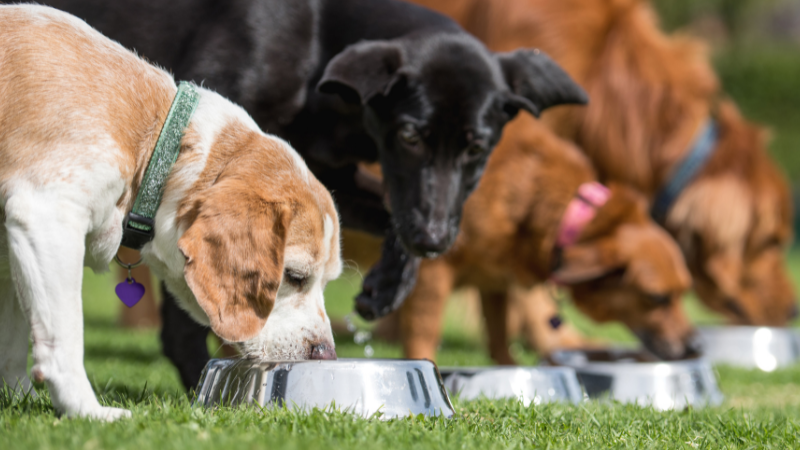
Cheeses To Avoid Giving Your Dog
Certain kinds of cheese should never be given to a dog due to their potential hazards to the dog’s health. These are the following:
- Blue Cheese
Blue cheese is not good for dogs as it contains a substance called roquefortine C, which can be toxic to dogs if given in large amounts.
- Feta Cheese
Due to the high fat and salt content of feta cheese, dogs run the risk of being dehydrated and experiencing various other health issues. So, it must be avoided.
- Processed Cheese
The chemicals and preservatives included in processed cheese can be hazardous to dogs. Processed cheese should be avoided when feeding your dog cheese.
Note: It is important to keep in mind that you should steer clear of any cheese that is rich in sodium, as this can cause your dog to get dehydrated, in addition to causing other health issues.
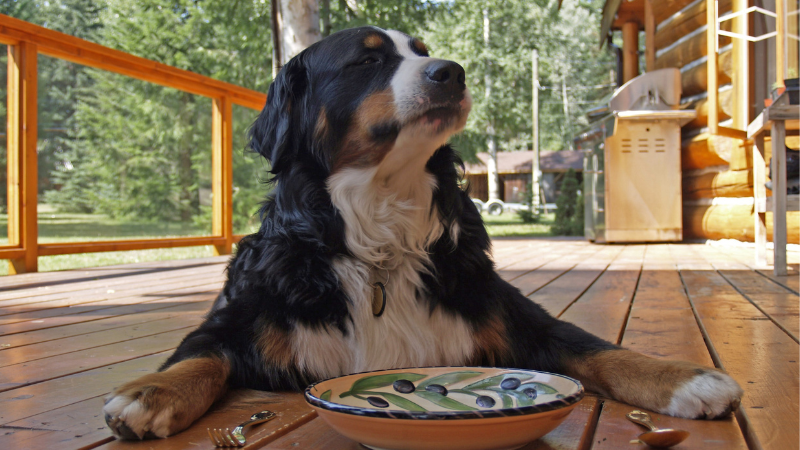
Some Important Things to Consider
When it comes to dogs and cheese, there are a few more considerations to take into account, including the following:
- Cheese Should Never Take the Place of a Healthy and Well-Balanced Diet
Cheese is a delectable delicacy that may be given to dogs, but it should never be used in place of a balanced and nutritionally sound meal. It is because it did not contain all the carbs, protein, and essential fatty acids that your dog needs.
Cheese is a good addition to a dog’s diet, but it should only be given to them in small amounts and only as a supplement rather than as a replacement for their primary source of nutrition.
- Cheese May Be Unpleasant for Lactose-Intolerant Dogs
Lactose intolerance affects not just certain people but also some dogs, which means that these dogs have trouble digesting foods that contain lactose. Your dog may be lactose intolerant if eating cheese causes them to feel gastrointestinal distress. In this case, you should refrain from feeding them cheese in the future.
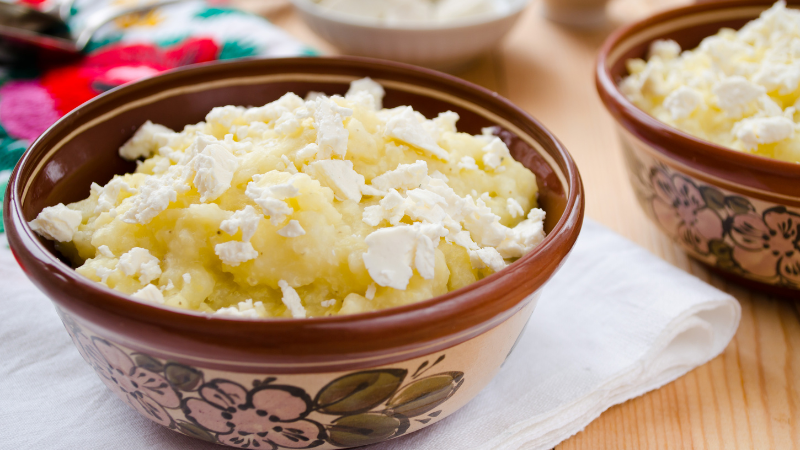
- Always Keep a Close Eye on Your Pet While They Are Eating Cheese
It would help to keep a close eye on your canine companion whenever you give them cheese to prevent them from choking or gulping down the food too rapidly. You should also make sure that your dog’s weight does not have any upset stomach or health issues.
How Should You Give Cheese to Your Dog?
It is essential to remember to use moderation whenever you provide your dog with cheese. Cheese shouldn’t be used as a substitute for meals; rather, it should be served as a snack or occasional treat. During workout sessions, a bite-sized slice of cheese makes for an excellent incentive and works well as an occasional snack.
It is recommended that you gradually include cheese into your dog’s diet to prevent any potential stomach concerns. Your dog’s reaction should be closely monitored when you start with a small dosage. If they react well, you should be able to raise the dosage progressively over time.
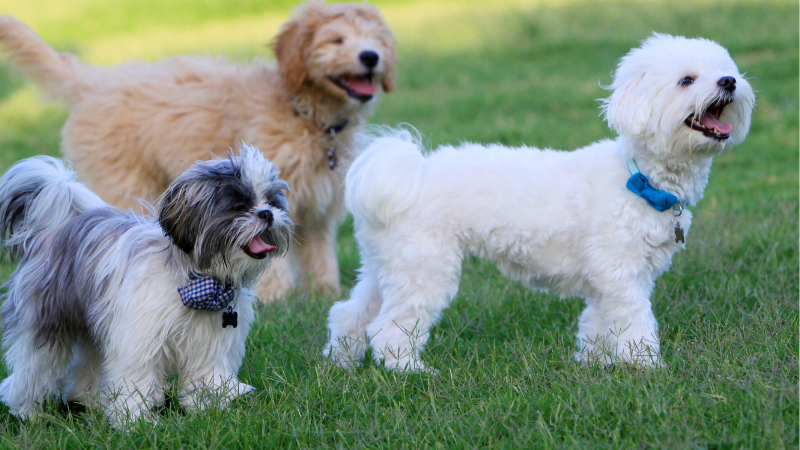
FAQs
How Much Cheese Is Considered Dangerous for Dogs?
Your dog should eat no more than 10% cheese. Excess cheese can cause digestive distress, weight gain, and other health issues in younger dogs if consumed excessively.
Here is the complete research paper on the cheese and dogs association.
Are Cheese Puffs and Cheese Balls Safe for Dogs to Consume?
Cheese puffs and cheese balls are not appropriate treatments for canines to consume. These snacks often include a high amount of salt, fat, and chemicals, all of which can be detrimental to a dog’s health.
Also, they frequently contain artificial scents and colors, both of which might be troublesome for certain dogs. So, in no condition do dogs eat cheese puffs.
Is Cheesecake Safe for Dogs to Eat?
Although cheesecake is often regarded as one of the most delectable dessert options for people, canines should steer clear of it. Cheesecake is often heavy in sugar and fat, which can contribute to weight gain in dogs and other health issues.
In addition, wide varieties of cheesecake include components like chocolate or raisins, both of which are known to be harmful to dogs’ health.
Fact: Dogs eat cream cheese wherever they find it. Try to keep a good eye on cream cheese and your pooch all the time.
Can Dogs Eat Mac and Cheese?
Most dogs shouldn’t consume dog mac or mac and cheese (Although some dogs love this special treat along with their pet parents). These kinds of foods typically include a significant amount of fat, salt, and lactose, all of which are known to give dogs intestinal trouble and contribute to a variety of other health problems that are not good for dogs’ healthy immune and digestive systems. Additionally, mac and cheese or cheese recipes are usually considered human foods, and your dogs must avoid cheese. In case your dogs eat mac or a lot of dairy products, especially cheese, you should consult your vet immediately.
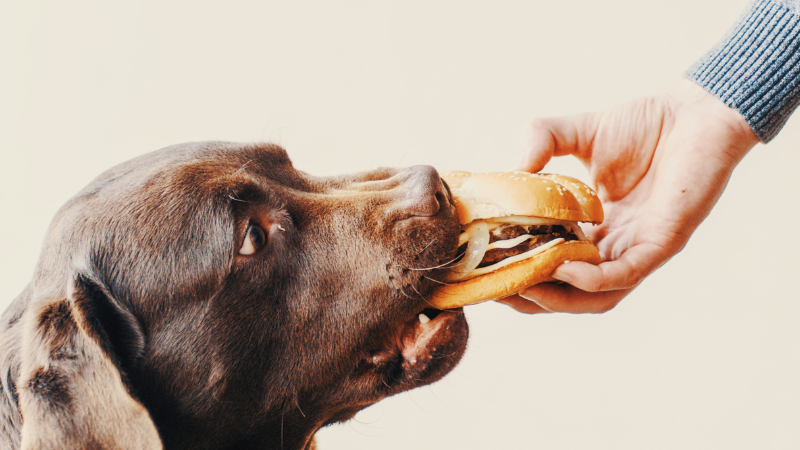
Conclusion: Can Dogs Eat Cheese?
When provided in moderation, permissible cheese types can be a wonderful treat for dogs in addition to being beneficial to their health. On the other hand, it is essential that you be aware of the possible dangers and that you refrain from feeding your dog cheese that is rich in lactose, salt, or additives.
Always seek the advice of your dog’s veterinarian if you have any questions or concerns regarding the dog food or the health of your canine companion. Additionally, you must consult your vet if your dog eats a boxed mac or a lot of cheese at the same time. It is because the excess quantity of cheese or any new foods is life-threatening for them.
